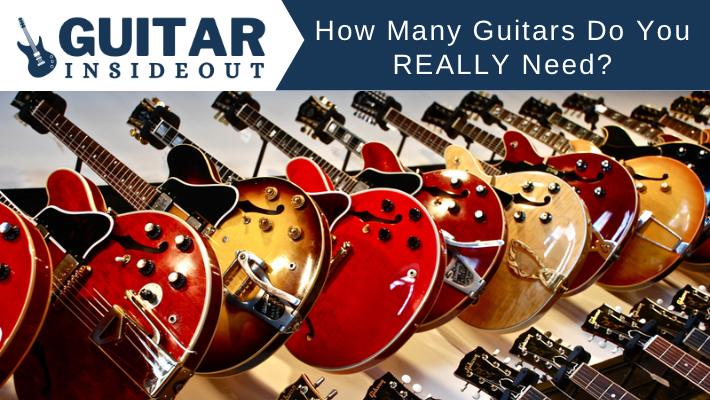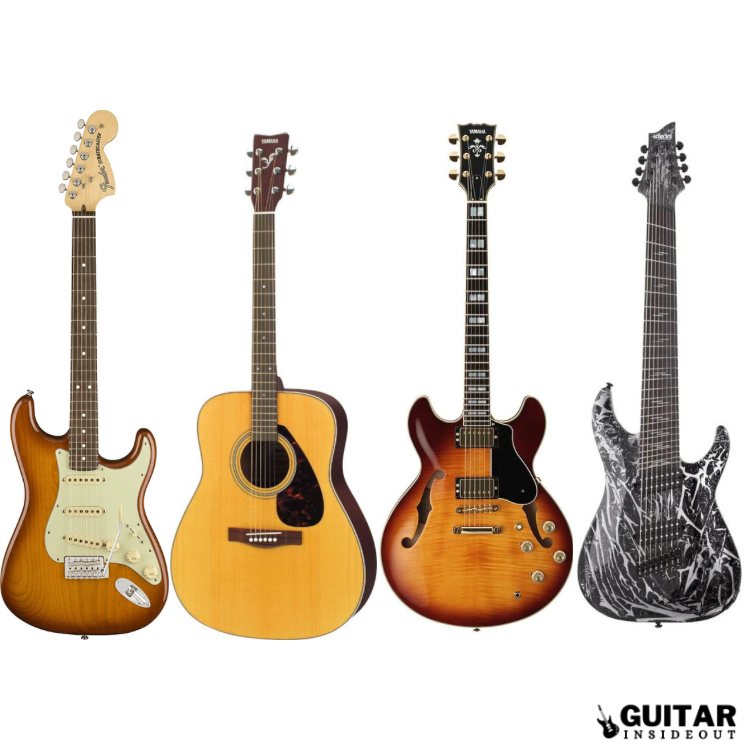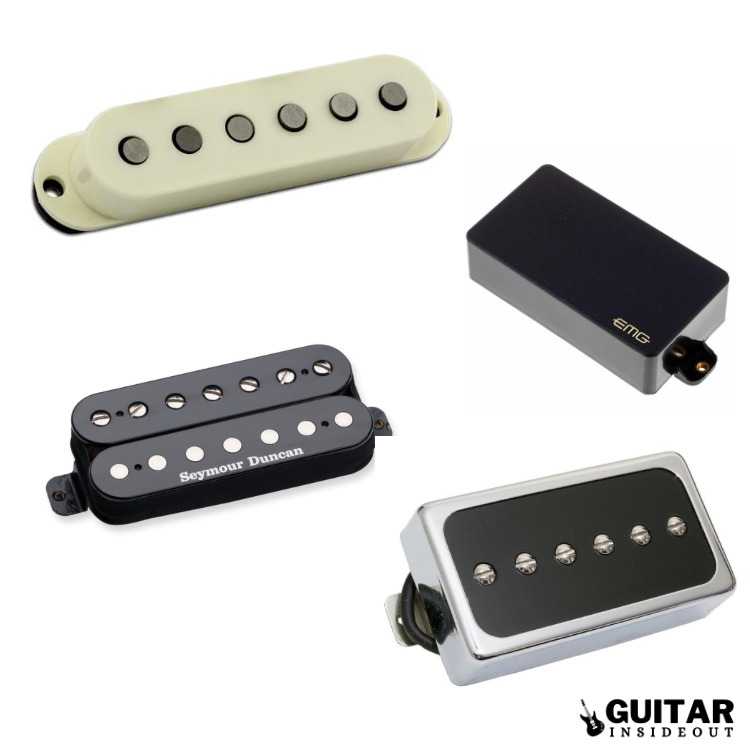If there’s one thing pretty much every guitarists wants it’s more guitars. Buying and owning guitars is so addictive there’s even a (joke) condition about it: GAS – Guitar Acquisition Syndrome.
But whilst that might be a bit of fun there is a serious question behind it – how many guitars do you really need? And how many guitars is too many guitars?

Is there a number where you should stop and think “I’ve probably for enough now”? I currently own 4 electric guitars and 1 acoustic and I’ve owned both more and less than that.
So, do guitarists only need a single guitar? It’s not quite as straightforward as that…
How Many Guitars do you Really Need?
If we’re being very pedantic then technically no one needs any guitars. You don’t have to play an instrument, it’s purely an enjoyable hobby or activity that many people like doing. But it’s not a need.
But if we accept that people are going to want to play the guitar (or any instrument) then we can look at whether there’s an optimal number of guitars to own.
I think part of the problem with this question though is that it’s mostly asked by people who don’t know much about guitars, being a musician or recording. They see one guitar and think they’re basically all the same.
But there are so many variations that affect how they play and sound. To most people a Les Paul and a Strat are just two guitars that do the same thing, but that couldn’t be further from the truth.
There’s so much more involved in how a guitar sounds – the pickups, the body size, the wood used etc. – and how it plays – neck shape and size, weight, fretboard material etc.
That’s before we even get into the various types of guitars like electric, acoustic, classical, 7 string and so on.
And think of it this way – how many pairs of shoes do you own? I’m guessing more than one, right?
Now, be honest, could you get by with only one pair? Probably. But different types of shoes suit different types of walking and situations. Hiking, running, formal, casual, and then there’s boots, sneakers, sandals etc.
Think of guitars in the same way. Just a little bit bigger and a lot more expensive!
Need more convincing though? Read on..
Reasons for Having Multiple Guitars
Let’s take a look at all the reasons you might want or need to have more than one guitar.
Different Styles of Music
Different guitars suit different styles of music. Yes, you can play speed metal with a Fender Mustang and use a Jackson for jazz, but it’s not ideal.
There are definitely certain guitars that are better suited to playing certain genres. A jazz guitarist won’t want a Flying V with EMG pickups in it and a death metal guitarist isn’t going to be rocking a 335 with low output pickups. It just isn’t going to work.
That doesn’t mean you can’t play those styles of music on any guitar, it just that it won’t sound right. So it’s understandable that you might want to have a few different guitars for moving around genres and sounds.
It the same for acoustic guitars too. A parlor guitar has very prominent mids and sounds boxy whereas a jumbo acoustic is very balanced, has a lot of bottom end and are ideal for chords. You’ve got grand auditorium’s, 000 / OM’s, dreadnaught’s and more.
Different Types of Guitar
The different types of guitars is enormous. There are:
- Electric
- Acoustic
- Classical
- Flamenco
- 7 string
- 8 string
- Semi hollow body
- Hollow body
- Slide
- Baritone
- Bass
And those are just the ones I can think of off of the top of my head! There’s probably a lot more.

All of those sound different as well as excelling at and not being suitable for different things. A Les Paul sounds very different to a Telecaster. You can try but they won’t ever sound alike.
On top of that you can’t play heavy metal on a nylon strung classical guitar in the same way you wouldn’t want to play a piece of Mozart on a slide guitar.
So if you want to play a variety of music you will need more than one guitar. If all you play is heavy metal and that’s all you’re ever going to play then one guitar will probably do.
But most of us like some variety. And if you’re a professional or even just play in a covers band for weddings there’s a very good chance you’ll need more than one guitar to play a variety of songs.
At the least one electric and one acoustic will be the minimum.
Different Pickups
The 4 types of pickups – single coil, humbuckers, P90’s and EMG’s – all sound very different. The same guitar with single coils and EMG’s will sound wildly different.
But each of those pickups has its place. And it makes sense to use them for different types of music.
You can’t keep switching out pickups in a guitar though. So what do you do? You get a few guitars with a selection of pickups, of course.
A Strat or Tele with single coils, Les Paul or PRS for humbuckers, maybe an SG for P90’s and an Ibanez or Jackson for EMG’s. Easy!

Different Tunings
This is one of the most important. If you are playing a lot of songs in different tunings you’ll quickly wish you had another guitar to leave in those different tunings.
Going from standard tuning to drop D isn’t much of a problem. You could get away with that.
But for half a step down (eb), open or drop tunings like C then having another guitar already in them is going to make life so much easier. Plus if you are constantly tuning back and forth it wears the strings out a lot faster and messes up the intonation.
Also guitars with Floyd Rose bridges can be a pain to switch tunings. You probably won’t want the hassle of retuning one on a regular basis (it’s a lot easier to leave it in whichever tuning you wish).
This might sound like it applies only to professional guitarists but even at home it’s much easier to have a couple of guitars in various tunings you can just pick up and play.
Backups When Playing Live
When you’re playing a live gig the last thing you want is your guitar to die on you. It happens more than you would think and if you only have that one guitar what are you going to do?
So having at least one backup is a must.
For Recording
If you are a recording artist, session musician or own a recording studio then having multiple guitars is a necessity. You are going to need to be able to produce a variety of tones and one guitar, even the most versatile, won’t cut it.
Quite often bands and artists will want to explore and find a tone that really compliments what they’re playing and that might mean trying multiple guitars. Experimentation and trying new ideas is a big part of recording so being stuck with a single guitar will hold you back.

Travelling
You might have a lovely Gibson Les Paul as your main guitar. It sounds fantastic, plays like a dream and all round it’s a wonderful instrument.
But if you’re travelling and still have want to practice or play then you probably aren’t going to want to take it with you. It’s heavy, large and might get damaged.
But a small, travel sized acoustic guitar is perfect in this situation. Another good reason for owning more guitars!

Sentimental Value
Do you own anything from your childhood that you don’t use? What about something that belonged to a relative that passed away? You might not use those items but they have sentimental value and amazing memories attached to them.
It’s the same with guitars. I’ve still got my Squier Stratocaster I learned on 20 years ago.
It’s not a particularly good guitar, I rarely play it and have others that are far better in every way. So why do I keep it?
Sentiment. There are lots of memories I associate with that guitar and it reminds me of the excitement I felt when I was first learning.
Emotional attachment may not be all that logical but it’s very powerful. And guitars aren’t immune from it.
How They Look
There are people who purely like to look at guitars. They hang them on their wall and may not even play them.
That may sound strange but I guess you could consider guitars as art.
Why the Hell Not?
Lastly, if you can afford multiple guitars then why shouldn’t you? It’s not hurting anyone and if it makes you happy then I say go for it.
Do you Need More Than One Guitar?
Short answer: If you’re not a professional or if you only play one style of music then you can easily get by with only one guitar. Whether or not you want to is an entirely separate question.
You could say that the optimal number of guitars is 3 – an electric guitar, an acoustic guitar and a classical guitar. That will cover close to everything.
But as we’ve already been over there’s lots of legitimate reasons for wanting and owning more guitars.
How Many Guitars Should an Amateur Have?
That depends entirely on how many they want. There’s nothing to stop an amateur or bedroom guitarist from owning as many guitars as they wish (assuming they can afford them).
Whether you’re a professional or not and what your skill level is shouldn’t be a factor in how many guitars you own.
Why do Guitarists Have Many Different Guitars?
If you’re a touring professional then it’s understandable for you to have more than one guitar. Think about it: if you’re playing live and have two songs with different tunings you don’t want to leave the audience twiddling their thumbs whilst you retune.
“Oh sorry everyone, give me a couple of minutes while I tune down half a step”.
Also you may have songs that require different sounds. Going from a big rock song to a an acoustic ballad is going to need a change in guitar.
Having multiple guitars makes everything a lot easier for a professional and in turn their performance and the gig will be better.
Which Guitar Should Everyone Own
A Telecaster, obviously.
I’m joking, of course. Personally I think Tele’s are the ultimate guitar and everyone absolutely should own one but that’s just me.
You should own whichever guitar makes you want to play it! Whether that’s a $150 Squier or a $5000 custom shop Gibson.
The right guitar is the one you want to pick up every time you see it. The one that inspires you to play and practice.

I own 6 squire’s that I customized, yet cost me less a single prs or less Paul. I always take a back up to gigs. 6 is my max limit though or I spend more time trying them out than actually playing. a friend of mine owns around 32 guitar’s, I don’t know how he does it lol, option anxiety is a real thing.